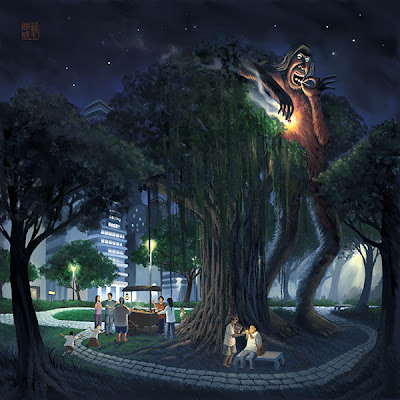Tikbalang is a creature of Philippine folklore said to lurk in the mountains and forests of the philippines It is generally described as a tall, bony humanoid creature with disproportionately long limbs, to the point that its knees reach above its head when it squats down. It has the head and feet of an animal, most commonly a horse. It is sometimes believed to be a transformation of an aborted fetus which has been sent to earth from limbo
Tikbalang
Kapre (related to the Agta in the Visayan dialect) is a Philippine mythical creature that could be characterized as a tree demon, but with more human characteristics. It is described as being a tall (7 to 9 ft), brown, hairy male with a beard. Kapres are normally described as smoking a big tobacco pipe, whose strong smell would attract human attention. The term kapre comes from the Arabic "kaffir" meaning a non-believer in Islam. The early Arabs and the Moors used it to refer to the non-Muslim Dravidians who were dark-skinned. The term was later brought to the Philippines by the Spanish who had previous contact with the Moors. Some historians speculate that the legend was propagated by the Spanish to prevent Filipinos from assisting any escaped African slaves.
Kapre
A Manananggal (sometimes confused with the Wak Wak in some areas by the Filipinos were called Penanggalan in Malay folklore which is a mythical creature. It resembles a Western vampire, in being an evil, human-devouringmonster or witch. The myth of the manananggal is popular in the Visayan region of the Philippines, especially in the western provinces of Capiz, Iloilo, and Antique. There are varying accounts of the features of a manananggal. Like vampires, Visayan folklore creatures, and aswangs, manananggals are also said to abhor garlic and salt.. They were also known to avoid daggers, light, vinegar, spices and the tail of a sting ray which can be fashioned as a whip Folklore of similar creatures can be found in the neighbouring nations of Indonesia and Malayasia.
manananggal
Dwende are little spirits, usually helpful and friendly, but when offended they can cause sickness and even death. They live in houses and occupy themselves by singing, making noise, and throwing sand and pebbles. They sometimes knock over kitchen utensils.
Dwende











No comments:
Post a Comment